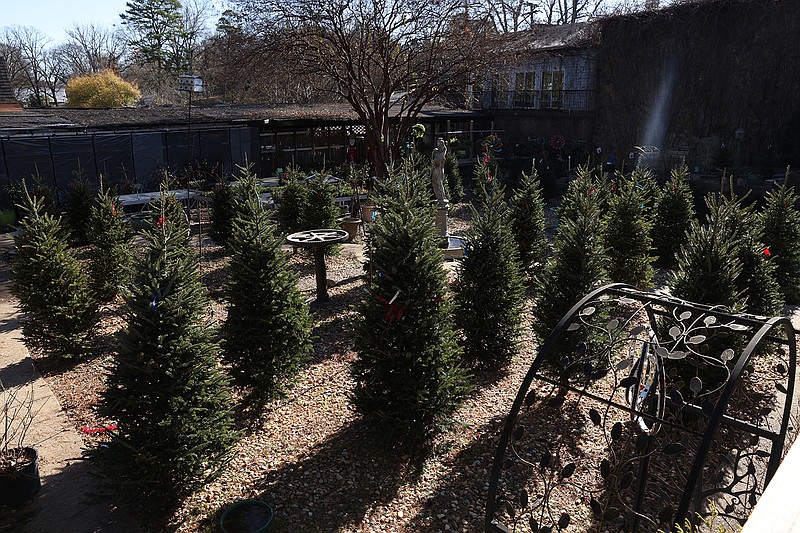A scorching summer and inflation put the squeeze on Arkansas' Christmas tree crop this year, but demand for locally grown trees has remained high, farmers said.
"We really had an insurgence of sales at covid and they have maintained," said Jim Lane, owner of Christmas Tree Lane farm near Ozark Thursday. "I think the boom was mostly that people wanted to get out of the house."
The high sales came after dry summer months and a rise in the cost of herbicides and insecticides this year. While he didn't adjust his prices this year, Lane said he might have to during future seasons.
Drought conditions cost Lane many of his seedlings, or young trees. To make up for the loss, Lane plans to plant around 1,500 trees next year -- or about 500 more than he would normally.
While planting the extra seedlings won't be a significant expense, Lane said his Christmas tree crop in about five years will likely be thinner.
The average growing time for a Christmas tree is seven years, but it can take as many as 15 or as few as four years for a tree to reach market size, according to the National Christmas Tree Association.
Harold McAlpine, owner of McAlpine Christmas Tree Farm in Bismarck, lost around 200 marketable trees and roughly as many smaller trees to drought.
"The biggest impact is the ones you put six years of work into having them ready to sell then you have no return on them," he said Thursday.
Greg Eckart said he and his wife had to close Pine Grove Christmas Tree Farm a couple of weeks early after losing trees to drought.
"We had a lot of trees die during the summer," he said.
Eckart said he didn't raise prices at his farm in Charleston this year but noticed that inflation had driven up the cost of everything from insecticides to candy canes.
"Candy canes have gone from $1 a box to $1.50," he said.
P.D. Warford, who runs Papa Santa's Christmas Tree Farm on the outskirts of Benton, said rising costs had pressed him to slightly raise his tree prices.
"This year I paid $650 for 1,000 pounds of triple 13 fertilizer," he said. "Two years ago ... that was less than $200."
Inflation also posed a challenge for McAlpine this year, especially when it came to minimum wage increases.
Following the outbreak of the coronavirus pandemic, McAlpine noticed people seemed willing to spend more on bigger trees and wreaths. While he figured demand may have slowed this year, he said it was hard to tell because of poor weather he had seen in recent weeks.
"This has been some of the worst weather we've had through a selling season," he said. "At least half of our weekdays have been heavy rain, fog, drizzle. Very miserable weather."
Jim Geisler, owner of Holiday Forest Christmas Tree Farm, said recent rainy weekends had also had a significant impact on his sales.
"This is in some ways worse than the drought," he said. "A customer doesn't want to come out and get a wet tree normally."
Despite the poor weather conditions, Geisler said he felt the demand for Christmas trees was still high.
"I think if the weather is decent you're going to have good business," he said. "I don't think there's any slacking off of business with everything else equal."
Nationwide, the demand for natural Christmas trees was expected to remain on par with last year's demand, according to a market forecast from the Real Christmas Tree Board.
"The grower survey tells us demand is healthy," said Marsha Gray, executive director of the board, in a news release. "Retailers see steady consumer interest in real Christmas trees and right now supply is pretty well matched to that interest."
All of the wholesale growers that responded to a survey from the board reported increased input costs. The biggest concerns for growers were supply chain slowdowns and the impact of inflation on consumer spending, according to the news release.

